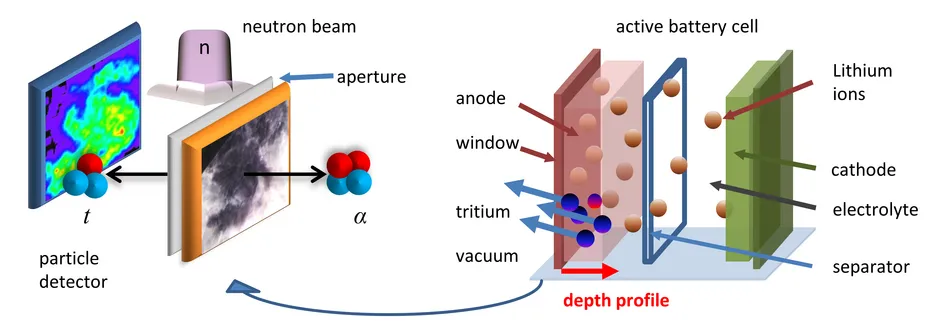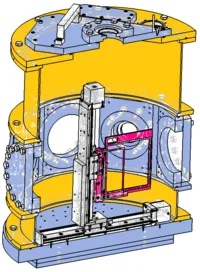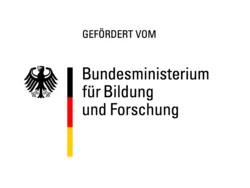Four-Dimensional Isotope-Sensitive Material Depth Profiling Using Cold Neutrons (N4DP)

Within this project we are extending the existing PGAA instrument at the FRM II by an option for neutron-based four-dimensional profiling (N4DP). This enables the non-destructive quantitative mapping of local distributions of light elements like 3He, 6Li, 10B or 14N with high sensitivity and resolution nearly independent of the bulk composition.
The project is conducted in close collaboration with Roman Gernhäuser (ZTL, Physik-Department), Ralph Gilles (MLZ) and Zsolt Revay (MLZ / PGAA).
You can find an introduction to NDPand its use with Li-ion batteries on Youtube.
For an overview on neutron depth profiling and its world-wide use, see Greg Downing's web site on NDP.
Properties of the Neutron Depth Profiling technique:
- Non-destructive quantitative analytical technique
- Detection of specific stable isotopes: 3He, 6Li, 10B, 14N, 17O, 33S, 35Cl
- Detection of radioactive isotopes: 7Be, 22Na, 37Ar, 40K, 59Ni, 210Po
- Detection of concentration profiles of given isotopes in almost any material matrix
- Accessible depth range material specific. Maximum range in solids <50µm
- Depth resolutions material dependent. Depth resolutions down to 5nm possible
Typical applications of NDP at the PGAA beamline

Overview of typical application branches of Neutron Depth Profiling at the PGAA beamline, shown together with already performed measurements:
- Manufacture quality control
- Surface analysis of Boron in Borofloat glasses (Neutron-guide material)
- Boron implantation profiling in Silicon substrates
- 3He implantation profiling in Silicon substrates
- Fundamental Nuclear Physics
- Materials Science and Engineering
- Boron profiling in CoRe-based superalloys for next-generation gas turbine heat-shieldings
- Composition and homogeneity determination of lithium-containing single crystals
- Energy Systems
- Lithium immobilization profiling in electrodes for Lithium-Ion-Batteries
- Operando tracking of Lithium reversibly incorporated in electrodes during dis-/charging
- Lithium-/Sodium-based electrodes for future battery systems beyond Litium-Ion-Batteries
- Lithium-based systems for Organic Light Emitting Devices (OLEDs)
- Healthcare
- Tracking of Lithium accumulation in the Human Brain
Hints for Users:
- Areal sample size max. 150x150 mm, sample sizes larger than 10x10 mm favorable.
- Reduce thickness of samples as much as possible in order to reduce background signal.
- Measurements within the framework of Rapid-Access or Full Proposals at MLZ possible.
- For a feasability check of the application please contact one of the following: markus.trunk(at)tum.de, maerkisch(at)ph.tum.de, roman.gernhaeuser(at)ph.tum.de
For an overview on neutron depth profiling and its world-wide use, see Greg Downing's webpage on NDP.
Selected Publications
4D Tomography for Neutron Depth Profiling Applications
R. Neagu, S. Golenev, L. Werner, C. Berner, R. Gilles, Z. Revay, L. Ziegele, J. Plomp, B. Märkisch, R. Gernhäuser
Nucl. Instr. Meth. A 1065, 169543 (2024)
10.1016/j.nima.2024.169543
Impact of Silicon Content within Silicon-Graphite Anodes on Performance and Li Concentration Profiles of Li-Ion Cells using Neutron Depth Profiling (NDP)
E. Moyassari. L. Streck, N. Paul, M. Trunk, R. Neagu, C.C. Chang, S.-C. Hou, B. Märkisch, R. Gilles, A. Jossen
J. Electrochem. Soc. 168, 020519 (2021)
10.1149/1945-7111/abe1db
Liquid Electrolyte-Based Lithium-Ion Battery Cell Design for Operando Neutron Depth Profiling
F. Linsenmann, M. Trunk, P. Rapp, L. Werner, R. Gernhäuser, R. Gilles, B. Märkisch, Zs. Revay, H. Gasteiger
J. Electrochem. Soc. 167, 10 (2020)
10.1149/1945-7111/ab9b20
SEI Growth Impacts of Lamination, Formation and Cycling in Lithium Ion Batteries
M. Frankenberger, M. Trunk, S. Seidlmayer, A. Dinter, J. Dittloff, L. Werner, R. Gernhäuser, Z. Revay, B. Märkisch, R. Gilles, K.-H. Pettinger
Batteries 2020, 6(2), 21 (2020)
10.3390/batteries6020021
Monitoring the Lithium Concentration across the Thickness of Silicon-Graphite Electrodes during the first (De-)Lithiation
M. Wetjen, M. Trunk, L. Werner, R. Gernhäuser, B. Märkisch, Zs. Révay, R. Gilles, H. A. Gasteiger
J. Electrochem. Soc. 166, 8, A1408-A1411 (2019)
10.1149/2.0581908jes
The new Neutron Depth Profiling Instrument N4DP at the Heinz Maier-Leibnitz Zentrum
L. Werner, M. Trunk, R. Gernhäuser, R. Gilles, B. Märkisch, Zs. Révay
Nucl. Instr. Meth. A 911, 30-36 (2018)
10.1016/j.nima.2018.09.113
Quantifying the Distribution of Electrolyte Decomposition Products in Silicon-Graphite Electrodes by Neutron Depth Profiling
M. Wetjen, M. Trunk, L. Werner, R. Gernhäuser, B. Märkisch, Zs. Révay, R. Gilles, H. A. Gasteiger
J. Electrochem. Soc. 165, 10, A2340-A2348 (2018)
10.1149/2.1341810jes
Materials Science Applications of Neutron Depth Profiling at the PGAA Facility of the Heinz Maier-Leibnitz Zentrum
M. Trunk, M. Wetjen, L. Werner, R. Gernhäuser, B. Märkisch, Zs. Révay, H. A. Gasteiger, R. Gilles
Materials Characterization 146, 127-134 (2018)
10.1016/j.matchar.2018.09.030
